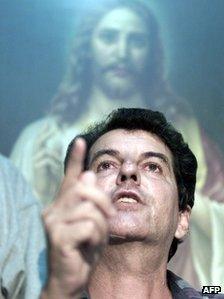Cuba dissident 'forced off road' to death, says family
- Published
Hundreds attended Mr Paya's funeral at San Salvador Catholic Church in Havana
Family members of prominent Cuban dissident Oswaldo Paya, who died in a car crash on Sunday, say they believe his car had been forced off the road.
At a funeral mass attended by hundreds of people in Havana, Mr Paya's son, Oswaldo, told the BBC that his father had received many death threats.
An official statement said the driver lost control as it drove on a road in eastern Granma province and hit a tree.
Mr Paya, 60, was one of Cuba's main pro-democracy campaigners.
A fellow activist, 31-year-old Harold Cepero, was also killed in the accident near the city of Bayamo, in eastern Granma province.
Two other people - one Swede and one Spaniard - were injured but have now left hospital.
Neither the Swedish not the Spanish embassies have confirmed Mr Paya's family's account of what happened.
Mr Paya's son told the BBC's Sarah Rainsford, in Havana, that the car had been pushed off the road deliberately.
An official enquiry has been launched.
Some of Cuba's main human rights campaigners attended the ceremony at San Salvador catholic church.
They vowed to continue fighting for democracy on the communist island.
Mr Paya is best-known as the founder of the Varela Project - a campaign to gather signatures in support of a referendum on laws guaranteeing civil rights.

Mr Paya was sent to a work camp in 1969 as punishment for his faith
Oswaldo Paya's widow, Ofelia Acevedo, spoke during the religious ceremony. She thanked human rights campaigners for their support.
Mr Paya's funeral is due to be held on Tuesday at the Colon Cemetery, in Havana.
His death comes after another prominent Cuban dissident, Laura Pollan, founder of the protest group Ladies in White, died last October.
Longstanding activist
In 2002, Mr Paya won the Sakharov Prize - the European Union's human rights award - for his work with the Varela Project, which was created in 1998.
In May 2002, he presented Cuba's National Assembly with a petition of more than 10,000 signatures calling for an end to four decades of one-party rule.
He has since repeatedly delivered petitions to the body, including one in 2007 calling for an amnesty for non-violent political prisoners.
The Cuban government described him as an agent of the United States who was working to undermine the country's revolution.
But he did not keep close links with the anti-Castro opposition in the US, which has criticised him for being too moderate.
A devout Christian, Mr Paya was also the founder of the Christian Liberation Movement, which campaigns for political change, civil rights and the release of political prisoners.
His influence is seen has having waned recently, with a new generation of internet-based activists, such as Yoani Sanchez, coming to the fore.
Born in 1952, Mr Paya became a critic of the communist government as a teenager.